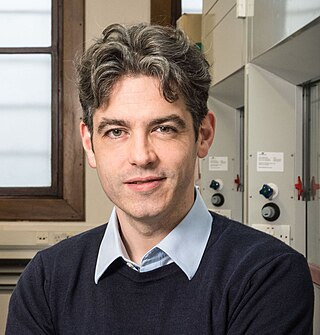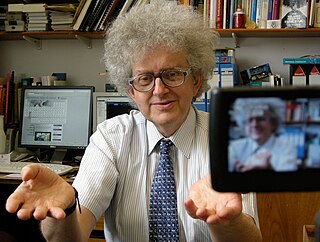Related Research Articles
Ian Fells is Emeritus Professor of Energy Conversion at the University of Newcastle upon Tyne, and former chairman of the "New and Renewable Energy Centre" at Blyth, Northumberland, England.

Sir James Fraser Stoddart is a British-American chemist who is Board of Trustees Professor of Chemistry and head of the Stoddart Mechanostereochemistry Group in the Department of Chemistry at Northwestern University in the United States. He works in the area of supramolecular chemistry and nanotechnology. Stoddart has developed highly efficient syntheses of mechanically-interlocked molecular architectures such as molecular Borromean rings, catenanes and rotaxanes utilising molecular recognition and molecular self-assembly processes. He has demonstrated that these topologies can be employed as molecular switches. His group has even applied these structures in the fabrication of nanoelectronic devices and nanoelectromechanical systems (NEMS). His efforts have been recognized by numerous awards including the 2007 King Faisal International Prize in Science. He shared the Nobel Prize in Chemistry together with Ben Feringa and Jean-Pierre Sauvage in 2016 for the design and synthesis of molecular machines.

George David William Smith FRS, FIMMM, FInstP, FRSC, CEng is a materials scientist with special interest in the study of the microstructure, composition and properties of engineering materials at the atomic level. He invented, together with Alfred Cerezo and Terry Godfrey, the Atom-Probe Tomograph in 1988.

Richard Henderson is a British molecular biologist and biophysicist and pioneer in the field of electron microscopy of biological molecules. Henderson shared the Nobel Prize in Chemistry in 2017 with Jacques Dubochet and Joachim Frank.

Leroy "Lee" CroninFRSE FRSC is the Regius Chair of Chemistry in the School of Chemistry at the University of Glasgow. He was elected to the Fellowship of the Royal Society of Edinburgh, the Royal Society of Chemistry, and appointed to the Regius Chair of Chemistry in 2013. He was previously the Gardiner Chair, appointed April 2009. In 2022, Cronin was suspended for three months from the Royal Society of Chemistry for a breach of their code of conduct.
Tobin Jay Marks is the Vladimir N. Ipatieff Professor of Catalytic Chemistry, Professor of Material Science and Engineering, Professor of Chemical and Biological Engineering, and Professor of Applied Physics at Northwestern University in Evanston, Illinois. Among the themes of his research are synthetic organo-f-element and early-transition metal organometallic chemistry, polymer chemistry, materials chemistry, homogeneous and heterogeneous catalysis, molecule-based photonic materials, superconductivity, metal-organic chemical vapor deposition, and biological aspects of transition metal chemistry.
Sir Robert William Kerr Honeycombe, was a Goldsmiths' Professor of Metallurgy and Professor Emeritus of the University of Cambridge. He was an Honorary Fellow of Clare Hall, Cambridge. Born in Melbourne, Australia, Honeycombe was elected a Fellow of the Royal Society in March, 1981 and served on the council. He was knighted in 1990.

Sir Martyn Poliakoff is a British chemist, working on gaining insights into fundamental chemistry, and on developing environmentally acceptable processes and materials. The core themes of his work are supercritical fluids, infrared spectroscopy and lasers. He is a research professor in chemistry at the University of Nottingham. His group comprises several members of staff, postdoctoral research fellows, postgraduate students and overseas visitors. As well as carrying out research at the University of Nottingham, he is a lecturer, teaching a number of modules including green chemistry.

Sir David William Cross MacMillan is a Scottish chemist and the James S. McDonnell Distinguished University Professor of Chemistry at Princeton University, where he was also the chair of the Department of Chemistry from 2010 to 2015. He shared the 2021 Nobel Prize in Chemistry with Benjamin List "for the development of asymmetric organocatalysis".

David Alan Leigh FRS FRSE FRSC is a British chemist, Royal Society Research Professor and, since 2014, the Sir Samuel Hall Chair of Chemistry in the Department of Chemistry at the University of Manchester. He was previously the Forbes Chair of Organic Chemistry at the University of Edinburgh (2001–2012) and Professor of Synthetic Chemistry at the University of Warwick (1998–2001).

Sir George Thomas Beilby was a British chemist.
Dame Lynn Faith Gladden is the Shell Professor of Chemical Engineering at the University of Cambridge. She served as Pro-vice-chancellor for research from 2010 to 2016.
Derek John Fray is a British material scientist, and professor at the University of Cambridge.
Guy Charles Lloyd-Jones FRS FRSE is a British chemist. He is the Forbes Professor of Organic Chemistry at the University of Edinburgh in the United Kingdom. His research is largely concerned with the determination of organometallic reaction mechanisms, especially those of palladium-catalyzed coupling reactions such as Suzuki-Miyaura coupling.
Charles Kemball CBE PRSE FRS FRSC FRIC was a Scottish chemist who served as President of the Royal Society of Edinburgh (1988–91) and as President of the Royal Institute of Chemistry (1974-6). He pioneered the use of mass spectrometry. and was a leading expert in heterogeneous catalysis.
The Beilby Medal and Prize is awarded annually to a scientist or engineer for work that has exceptional practical significance in chemical engineering, applied materials science, energy efficiency or a related field. The prize is jointly administered by the Institute of Materials, Minerals and Mining, the Royal Society of Chemistry and the Society of Chemical Industry, who make the award in rotation.

Raymond Edward Smallman was a British metallurgist and academic known for his research into alloys and the causes of metal fatigue. Smallman was also a significant figure at the University of Birmingham, serving as its vice-principal between 1987 and 1992 and helping to establish its reputation as a leading modern research university.

Javier Pérez-Ramírez is a Professor of Catalysis and Chemical Engineering at ETH Zurich.
Sir Harry Work Melville, was a British chemist, academic, and academic administrator, who specialised in polymer research. He spent his early career in academia as a lecturer and researcher, before moving into administration as a civil servant and university college head.
Alastair Ian Scott was a Scottish-born American organic chemist who achieved international renown for elucidating the biosynthetic pathway of vitamin B12.
References
- ↑ "Beilby Medal and Prize 2008 Winner". Royal Society of Chemistry . Retrieved 17 February 2018.
- ↑ "Professor Neil B McKeown". University of Edinburgh . Retrieved 18 September 2016.
- ↑ "Keynote Speakers - Neil B. McKeown". Imperial College London . Archived from the original on 2 August 2016. Retrieved 18 September 2016.
- ↑ "RSE Welcomes 60 New Fellows" (Press release). Royal Society of Edinburgh. 15 February 2017. Retrieved 28 March 2017.